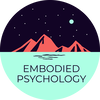I AM
Nicole Perry
Writing about mental health from a feminist counselling perspective
|
“I don’t want to get into some kind of unhealthy codependency,” *Lydia said, referring to her new relationship. I gave her a quizzical look. I’m familiar with the concept of codependency, but I wasn’t sure what she really meant by it. Just by what I already knew of her, it seemed like a strange thing to be worried about, so I asked her to elaborate. She went on to describe not wanting to be in a position of needing her partner, or spending “too much” time together. I knew what she was getting at. In our culture we have a really aversion to being seen as “needy” or too reliant on a relationship, instead valuing independence and self-determination. And while there’s nothing wrong with a little independence, it’s too often upheld as the be all end all, with little room for connectedness and community.
“You know, there’s nothing wrong with having needs,” I suggested, “we are human, after all. We’re a pretty social species – it’s part of our survival to depend on each other”. And this isn’t just my personal belief. Sue Johnson’s research on adult attachment really supports the idea that by forming close, connected relationships of mutual reliance, we’re actually in a better place to grow. One way I’ve heard her describe a these relationships is a safe base from which you can explore. This is where I have issues with the way people talk about and understand codependency. Now, the original concept was actually fairly good. Melody Beattie introduced us to the term with her bestselling book “Codependent No More”. When she started writing about this concept decades ago (1986), the term “codependence” was used to describe partners of people suffering from addictions and the particular struggles they go through, often related to boundaries and over-focusing on fixing others. I still believe she laid important groundwork in helping us understand the experiences of people who are supporting a partner in their addiction and caught up in caregiver roles. But as you can see, the original concept and how it’s talked about today are miles apart. First, codependency has been overgeneralized to apply to almost anyone who has difficulty setting boundaries. And as I’ve talked about, another problem is the way it’s been misinterpreted, as if any hint of having a need in relationship is a bad thing. When someone expresses a need in their relationship, they’re immediately accused of being “codependent”. We’ve learned to sling around the word like an insult, and use it to describe any behavior where someone is expressing their needs. Especially if those needs are in conflict with what we want. The next time you catch yourself worrying that you’re being “codependent” (or being told by someone you’re dating that you are) you can ask yourself… am I caught up in a unhealthy cycle of controlling and fixing my partner at a detriment to myself? Or am I simply looking for a relationship of mutuality where it’s okay to express needs? Most often, I think you’re going to find – you’re not codependent, just human. *Please note: I always change names and details about my clients’ stories, often combining several stories into one cohesive narrative.
3 Comments
2/28/2019 04:28:53 pm
Codependency is not an entirely bad trait to have. I believe that being codependent is just a sign of being human. There is this very famous saying that "No man is an island" this is very true. It basically means that no one can live by themselves. Well, you could say that you are a very independent person, however, that does not mean that you can live by your lonesome for the rest of your life, you will need someone too.
Reply
Leave a Reply. |
AuthorNicole Perry is a Registered Psychologist and writer with a private practice in Edmonton. Her approach is collaborative and feminist at its heart. She specializes in healing trauma, building shame resilience, and setting boundaries. About the Blog
This space will provide information, stories, and answers to big questions about some of my favorite topics - boundaries, burnout, trauma, self compassion, and shame resilience - all from a feminist counselling perspective. It's also a space I'm exploring and refining new ideas.
Archives
February 2024
Categories
All
|
Online Portal for Clients
Once we are working together, please use the Owl Practice Client Portal to
|
|
